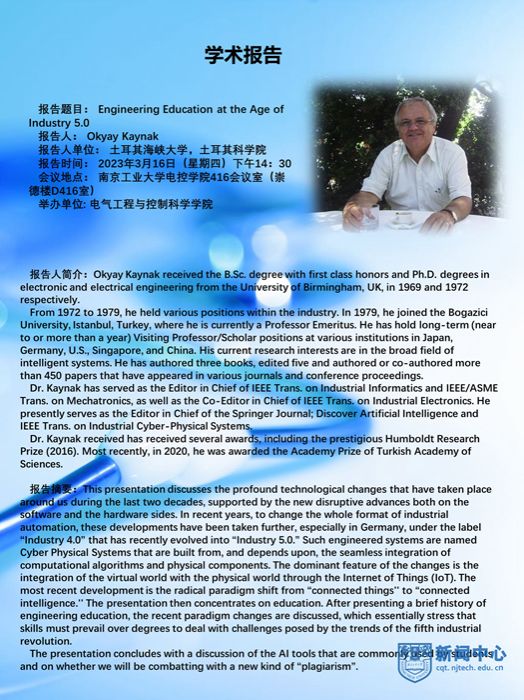學(xué)術(shù)活動 NAVIGATION
- 首頁
- >
- 學(xué)術(shù)活動
- >
- 正文
學(xué)術(shù)活動 NAVIGATION
報(bào)告題目:Engineering Education at the Age of Industry 5.0
報(bào)告人:Okyay Kaynak
報(bào)告人單位:土耳其海峽大學(xué)、土耳其科學(xué)院
報(bào)告時(shí)間:2023年3月16日(星期四)下午14:30
會議地點(diǎn):電氣工程與控制科學(xué)學(xué)院416會議室(崇德樓D416室)
舉辦單位:電氣工程與控制科學(xué)學(xué)院
報(bào)告人簡介:Okyay Kaynak received the B.Sc. degree with first class honors and Ph.D. degrees in electronic and electrical engineering from the University of Birmingham, UK, in 1969 and 1972 respectively.
From 1972 to 1979, he held various positions within the industry. In 1979, he joined the Bogazici University, Istanbul, Turkey, where he is currently a Professor Emeritus. He has hold long-term (near to or more than a year) Visiting Professor/Scholar positions at various institutions in Japan, Germany, U.S., Singapore, and China. His current research interests are in the broad field of intelligent systems. He has authored three books, edited five and authored or co-authored more than 450 papers that have appeared in various journals and conference proceedings.
Dr. Kaynak has served as the Editor in Chief of IEEE Trans. on Industrial Informatics and IEEE/ASME Trans. on Mechatronics, as well as the Co-Editor in Chief of IEEE Trans. on Industrial Electronics. He presently serves as the Editor in Chief of the Springer Journal; Discover Artificial Intelligence and IEEE Trans. on Industrial Cyber-Physical Systems.
Dr. Kaynak received has received several awards, including the prestigious Humboldt Research Prize (2016). Most recently, in 2020, he was awarded the Academy Prize of Turkish Academy of Sciences.
報(bào)告摘要:This presentation discusses the profound technological changes that have taken place around us during the last two decades, supported by the new disruptive advances both on the software and the hardware sides. In recent years, to change the whole format of industrial automation, these developments have been taken further, especially in Germany, under the label “Industry 4.0” that has recently evolved into “Industry 5.0.” Such engineered systems are named Cyber Physical Systems that are built from, and depends upon, the seamless integration of computational algorithms and physical components. The dominant feature of the changes is the integration of the virtual world with the physical world through the Internet of Things (IoT). The most recent development is the radical paradigm shift from “connected things'' to “connected intelligence.'' The presentation then concentrates on education. After presenting a brief history of engineering education, the recent paradigm changes are discussed, which essentially stress that skills must prevail over degrees to deal with challenges posed by the trends of the fifth industrial revolution.
The presentation concludes with a discussion of the AI tools that are commonly used by students and on whether we will be combatting with a new kind of “plagiarism”.
審核:薄翠梅
